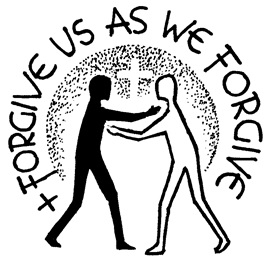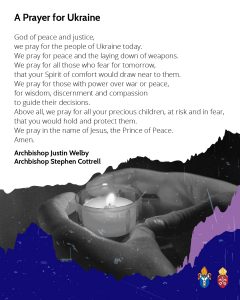Ash Wednesday 2022
Joel 2:1-2, 12-17, Matthew 6;1-6.16-21
In the name of God the Father, God the Son and God the Holy Spirit. Amen
As we travel through Lent this year, we will be considering the phrases that make up the Lord’s prayer in the version we most commonly use in Church. As we do this we will be contemplating what Jesus really said about that phrase and what he really meant (whether or not as we shall see what we say in the prayer itself is actually in the 2 different gospel account versions from Matthew and Luke).
I will also be sharing with you week by week the pictures in this book which accompany each phrase. This is a book I acquired quite by chance. It contains coloured pictures drawn by Richard Jesse Watson, with hidden depths in them. One for most of the phrases of the Lord’s prayer. All the human characters in the pictures are children as we are all children of God.
Though it might be logical to start at the beginning of the Lord’s prayer, in fact in view of the underlying rationale of Ash Wednesday, it makes much more sense today to talk about repentance and forgiveness. The phrase I will be using today is therefore of course
And forgive us our trespasses as we forgive those who trespass against us.
Here is today’s picture. There’s a girl in the foreground with a slightly conspiratorial and miffed expression. Turning to the light and in the doorway one of her sisters looking more penitent is to be seen returning a beloved bear. The sister with the bear does look contrite. One hopes that the look in the wronged girl’s face melts as the bear is returned, and the girl bringing back the bear is duly forgiven and the whole incident is forgotten. It’s as easy as that! But from our life experiences we know this kind of forgiveness is far from easy. This kind of forgiveness is far from easy and sometimes depending on the circumstances can be beyond us. Likewise, sometimes things can drag on to the point that we have rather forgotten what they were about in the first place. There are difficult questions to address when we are the one being Getting caught out in the wrong can be very painful especially if we have made it worse with papering over the cracks of our actions. Or where more and more bluster won’t wash. Unfortunately, we have probably all been there and got the t-shirt at some point. It can have big implications and we may have made it worse in the mean time. But coming clean and being truly sorry for our actions is best for us and for everyone around us in the long term.
It is interesting that today’s gospel reading from Matthew is literally the teaching Jesus gave either side of teaching all the people listening to him on the mountain how to pray the Lord’s prayer. And it is all about not being hypocritical! So today a little later when it comes to our time of penitence and saying sorry to God, I will ask for forgiveness for my poor judgements. More importantly on those aspects of my life where I too am papering over the cracks of bad choices
The wording of this part of the Lord’s prayer is also difficult. The version we use week in week out uses the words trespasses, to describe what we have done wrong. For me this is not always the clearest of words. In modern language we have rather relegated the word related to a trespass to meaning straying on to land that is not ours. And its most common usage is in signs saying – Trespassers will be prosecuted
It is very difficult to talk about trespassing, without thinking of the trespassing going on in Ukraine currently. Let’s pause for some silence and pray – I will conclude this time with the prayer written by the Archbishops.
The original meaning of the word trespass is a transgression of a moral or social law, code, or duty. To trespass is to commit an offense or a sin; transgress or err, or to invade on privacy, time or attention of another. This idea of physically encroaching other’s boundaries is dominant today. We need to think of trespass in this more ancient way to use it correctly in the Lord’s prayer.
The more modern translation of the Lord’s prayer authorised for use in the Anglican Church substitutes the word sin for trespass. So the phrase goes – Forgive us our sins as we forgive those who sin against us. This is more in keeping with how we use the word sin today. That word means – a transgression of a religious or moral law, especially when deliberate. In Christian terms – this can even be deliberate disobedience to the known will of God or something regarded as being shameful, deplorable, or utterly wrong. To sin means to violate a religious or moral law or to commit an offense or violation.
In our act of penitence, we will be reminded of the range of things beyond the scope of Christian morality and the potential for sin in our lives. This can be helpful as we bring to God our failings completely to wipe the slate clean as Lent begins.
On closer examination neither our usual translation of the Bible in either place the Lord’s prayer in the gospel is recorded or even in the King James version (KJV) renders this phrase exactly like we normally say it and this may surprise you. The Luke version in the KJV says ‘and forgive us our sins; for we also forgive every one that is indebted to us, and the Matthew version says and forgive us our debts, as we forgive our debtors. Introducing the concept of debts, debtors and indebtedness into the mix. Any entanglement with a more protestant church in this country (particular the more protestant presbyterian element of Scotland) will have encountered this in the traditional version of the Lord’s prayer too.
Again in our development of language debt has come to mean, something owed, such as money, goods, or services or an obligation to pay something. Where as a more ancient understanding was a debt as an offense requiring forgiveness or reparation; The dictionary I looked up here had a rather circular reference indicating a debt was equivalent to a trespass. This develops into an understanding of being a debtor. Meaning as well as owing something to someone, being one who is guilty of a trespass or sin; a sinner. So using that word acknowledges my favourite Ash Wednesday line – We are all sinners! But takes us on also to the more useful verb brought to bear of being indebted and the adverb indebtedness!
What does to be indebted mean? Morally, socially, or legally obligated to another; beholden or to be owing gratitude and thankfulness. This is where all this gets really interesting that there is and should be abiding thankfulness for forgiveness from God – Forgiveness we do not deserve but is ours through God’s love and the actions of his son. We are required to pass on our thankfulness to God for being forgiven by holding up the light of God’s forgiveness to those around us.
We have talked before about the power of forgiveness and examples of it from our contemporary world, which can transform things forever and most of all transform us. Let’s work through these thoughts by concentrating this Lent on our indebtedness to God, and our need to share God’s love with others by seeking forgiveness when we have been in the wrong. Mirroring the mercy of God by being forgiving when we have the opportunity.
I will end with one final observation about this picture that I do not think it is coincidence that the child seeking forgiveness is bathed in light and is bringing light into the room. As we seek to forgive and be forgiven we too will be bathed in the light of God’s love for us and stand a better chance of sharing that love with everyone we meet – bringing God’s light into the rooms where we are too. Amen
References:
Some material included in this service is copyright: © The Archbishops’ Council 2000-2022
King James Version of the Bible in the public domain
The New Revised Standard Version (Anglicized Edition), copyright 1989, 1995
The Lord’s Prayer by Richard Jesse Watson published by Zonderkids 2010

